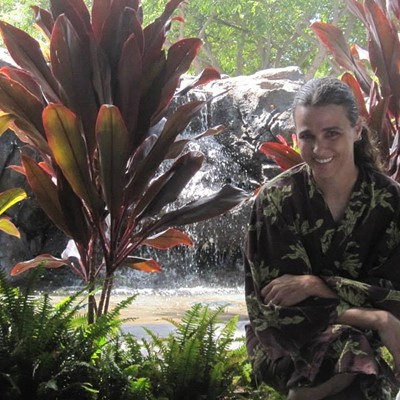The meeting, which took place Wednesday night at The Firehouse, was the largest Phoenix NORML meeting to date -- probably largely due to the recent passage of Proposition 203, the Arizona Medical Marijuana Act.
The standing room-only crowd was a diverse group, ranging from young guys with long hair and girls in tie-dye to middle-aged folks in business casual dress. Everybody had lots of questions for the board members of Phoenix NORML, but first, the audience was treated to a fire dancing performance.
More meeting info and Prop 203 madness after the jump ...
More meeting info and Prop 203 madness after the jump ...
After the curvy dancer finished breathing fireballs on stage and some reggae songs played on the loudspeakers, board members of Phoenix NORML took the stage to discuss many things, including Prop 203, local cannabis book clubs, boycotts, and the need for ongoing support.
The first Phoenix NORML board member to speak was Joe Sawinski. Referencing the Prop 203 victory, he said, "This is not just for Arizona...this is for everybody on the planet."
Sawinksi was followed by Kathy Tranchese. "I am Jack's thirst for cannabis knowledge," she said, referencing the book and movie Fight Club before announcing she's going to be hosting a book club every third Saturday of the month on Jack Herer's The Emperor Wears No Clothes, which she called "The hemp bible." (Book studies takes place at noon, at Steele Indian School Park.)
Tranchese also encouraged a boycott of Kimberly Clarke paper products, because she says the company is pro pot prohibition. She also referenced misinformation in the media dating back to the early days of marijuana prohibition. "Thank Jah for the Internet," Tranchese said. "Social media can keep us together and get our message out there."
Rain Baker of Camp 420 then spoke, and encouraged Prop 203 supporters to contact local politicians who have spoken out against the measure -- specifically, state Senator Russell Pearce. "The law is strong...but we have to be on top of it and make ourselves known," Baker said.
After Baker spoke, a medical marijuana patient named Eric told his story. "I'm glad it passed, not only as a patient myself, but as an activist," he said from his wheelchair. He went on to say he grew up Mormon, and that his parents were opposed to medical marijuana until they saw how cannabis helped him.
Then Tea addressed the stoner activist crowd, and enterprising people eager to jump into the system without knowing how it works yet. "If you go out in your beanie and tie-dye and ripped jeans and you campaign for medical marijuana because you believe in legalization -- that's not going to change any minds," she said.
She also shook a proverbial finger at people setting up "mock dispensaries and not even dressing the part."
It may sound harsh, but Tea's overall message was simply that Prop 203 is about medical marijuana, and the only way to procure future freedoms for cannabis is to not abuse the system and project images of baked, unproductive potheads. "Talk to your families, your friends, your doctor -- the people that know you're not just some stoner slacker loser," Tea said.
After encouraging people to sign up for the Phoenix NORML e-mail list, Tea introduced the guest speaker, Andrew Myers of the Arizona Medical Marijuana Policy Project. Myers was instrumental in continuing the Prop 203 campaign push, even after losing funding from the national Medical Marijuana Policy Project back in February.
Like Tea, Myers spoke against "the cultural industry" that has polluted the medical marijuana systems in states like California and Colorado. He expressed happiness that Prop 203 passed, but noted that it was the only marijuana bill to pass in any state this past election. "The lesson of this election was, we have met the enemy, and it us," Myers said.
Myers also complimented the professionalism of Arizona Department of Health director Will Humble, who privately opposed the measure but refused to become an anti-Prop 203 spokesman during the campaign.
In regards to timelines, Myers said potential patients will probably be able to begin applying for medical marijuana cards next March. Dispensary applications will also be taken around this time, but the law currently provides for around only 120 dispensaries. The first dispensary could open about a year from now, around next October. The Arizona Department of Health still has to come up with a regulation plan for dispensaries, but Myers said, "I would expect the regulations to be fairly strict. I would recommend legal representation, at the very least."
Then Myers started taking questions. And there were a lot of questions. People started shouting them all at once, until Tea politely said, "I know everybody's really excited, but please, let's keep it to one question at a time."
Among the questions were: "Will Veteran's Administration hospitals be dispensing marijuana?" (No, they won't); "Can patients grow their own marijuana?" (Yes, they can, provided there's no dispensary within 25 miles of their home); and "Who's going to set the prices for the marijuana at dispensaries?"
In answer to the last question, Myers said, "Prices will be set by the market, to a certain extent." He went on to explain that establishing and running a dispensary is very expensive, so medical marijuana may be more expensive than people expect.
Expensive or not, the bottom line is that medical marijuana will soon be available and legal in Arizona. And to many, that alone is priceless.
To learn more about Phoenix NORML and their monthly meetings, visit phoenixnorml.net To learn more about Arizona Medical Marijuana, visit azmma.org.











